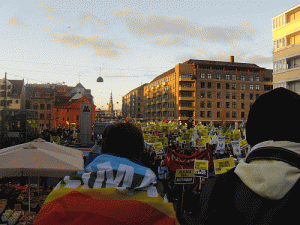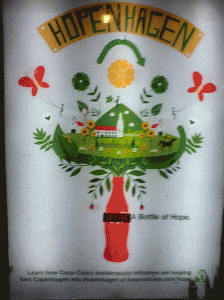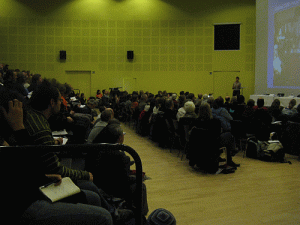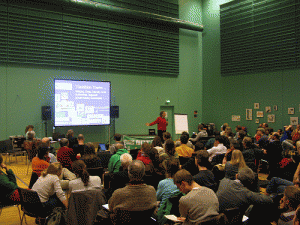17 Dec 2009
A Copenhagen Christmas Present from Naresh Giangrande
A Copenhagen Christmas Present: December 15th 2009. Copenhagen.
As many have now written, the Cop15 conference, which is focussed on creating a treaty that will prevent our climate from undergoing a systems state change and re-establishing itself in a new stable state that much less conductive to human survival, seems certain to fall far short of what is needed or fail completely. In describing what the treaty has to do I am calling attention to the meta narrative in the story of these negotiations. That is we have a self referential system, our economic and politic systems which takes little account of the ecology of our planet. We think in terms that ignore the basis of life.
Let’s be clear that if we as a culture (Arne Naess called it Industrial Growth System- IGS), the culture that invented the current dominant form of human society, are to make a transition to something more in line with long term survival of life on earth we must bear a collective responsibility for the collective failure to achieve what is necessary. The politicians have not failed us; we – all of us- have failed to create the conditions for a political settlement. It is a shallow reading of the current paradigm to see one part of the system as wrong or to blame. The politicians and business are only doing their job.
We have not redefined what that job now should be or how to go about it. Blaming politicians or business is a mistake. I don’t mean we who are at the Klimaforum, but we all of us. For we are all part of the same system and it will be by only seeing ‘us’ rather than ‘them’ that we will create the conditions for a real systems change. The slogan de jour of this conference has been System Change not Climate Change. Where is the systems change? There is none, here in Copenhagen it’s business as usual. When the conditions for a systems change are in place we will be in a position to achieve a political treaty.
We are all dependent on the IGS, like it or not, for most of the things we need to live. When you begin a process like Transition, then it’s as if you start putting a foot on a conveyor belt going in the opposite direction while having the other foot on the IGS belt. I can get really uncomfortable really quickly! So we hop on and off on conveyor belt to the to the other. When we get to a place where we have created enough of what we need on the Transition conveyor belt we then don’t need the IGS or only occasionally. Of course this is a simplification, but it goes something like this, my point is you can’t leave one system without having another in place.
We hear lots of ‘noise’ from the conference about the treatment of the Global South by the Global North, and the ins and outs of the Kyoto process track vs the USA and European track, and the long negotiations involved in having to negotiate parallel tracks. I was talking to a member of a UK government commission who has been in on the talks. She said that they were going sentence by sentence, and taking ages to decide on “A comma or a full stop?” The really important work? Nothing, just avoidance.
 There has been more noise created as a result of confrontation with police, who I feel have reacted deliberately so as to make the most of any aggression with heavy handed tactics and mass arrests. I spoke with several who were in the alternative community of Christiana last night. The police surrounded the whole area where people were partying and relaxing in a good natured atmosphere. One who was there said she had never seen so many police before; they streamed into the community with CS gas and baton charges arresting 179 for no apparent reason.
There has been more noise created as a result of confrontation with police, who I feel have reacted deliberately so as to make the most of any aggression with heavy handed tactics and mass arrests. I spoke with several who were in the alternative community of Christiana last night. The police surrounded the whole area where people were partying and relaxing in a good natured atmosphere. One who was there said she had never seen so many police before; they streamed into the community with CS gas and baton charges arresting 179 for no apparent reason.
 One Swedish boy who couldn’t have been more than 17 told me he had been held for over 20 hours in a cage with no food, water or access to a toilet after the march on the 12th. Many other arrested were held in freezing conditions, made to sit hand cuffed together on the frozen ground for 5 hours. Many pissed themselves. It feels like the police actions are designed to make more noise and distract us from the real issues. Why all this noise?
One Swedish boy who couldn’t have been more than 17 told me he had been held for over 20 hours in a cage with no food, water or access to a toilet after the march on the 12th. Many other arrested were held in freezing conditions, made to sit hand cuffed together on the frozen ground for 5 hours. Many pissed themselves. It feels like the police actions are designed to make more noise and distract us from the real issues. Why all this noise?
We are faced with a system that cannot and will not make the changes necessary to create a resilient world in the face of climate change and peak oil. It would go against everything the system is designed for. Economic growth and non renewable resource use are not the marks of a system that is ‘fit for the purpose’ of 21st century life. These talks so far are engaged in somehow allowing the present system to go on for a time longer, that’s all. Gordon Brown might have flown in 48 hours earlier than planned to ‘bang heads together’. But what does he hope this head banging will achieve? The necessary steps to halt CO2 emissions would be too painful to achieve and would not be accepted by the electorate in any industrial country.
From where I am standing the best thing that could happen right now is for the talks to fail. There is talk of the G77 nations on Wednesday staging a walk out and holding a summit with demonstrators outside the Bella Centre where the main negotiations are taking place. It feels like the best solution right now would be to not have a treaty that politicians can wave in front of the folks back home and say, ‘see we succeeded!’. Rather it would be better if we confronted them with the failure of the present system to create a world that our method of determining truth – science- says will be stable and fit for the purpose of life.
What should we in turn do? There are many pieces that will need to be put into place but one of the biggest and most important will be to go on with the business of creating a new system that makes the present system obsolete. Transition is in that business and that’s its purpose, to make a world that is fit for the purpose of life on planet earth. Whoever and whatever system, persons, or organisations that are in the same business we will happily collaborate with, and I am sure they will also be happy to join in. Indeed I have met some of them this last week.
Only when the necessary conditions for a paradigm shift are in place that will allow us to make the necessary changes that a resilient culture demands, will we get a society ‘fit for the purpose of life’. The Transition approach is designed to start creating those new structures and systems of living right now and start putting into place alternative arrangements for every system we now depend. Only where there is enough in place that we can start to depend on it will the size and scale of change occur. We can’t just throw away the present mind set and life support systems. We need something in place, a parallel system that can begin to carry us and support us. A space craft would not be able to turn off its life support systems without having a back up in place. That is the position we find ourselves in.
If nothing else has come out of Copenhagen then failure of the current system then this would be a great step forward. A paradox? Only if you see nothing else. There are bill boards all around Copenhagen proclaiming Hopenhagen, supported by mendacious green washing corporations like Coke (see pic at the start of this piece). For me hope springs from the eventual withering away of our current system and its gradual replacement with one that can allow to emerge, using all of our technological prowess and creativity, a life supporting- for all of life- human presence on the planet. The Shambala Warrior tradition, part of the ancient Tibetan Buddhist tradition, talks of the setting sun culture that looks to death and the Great Eastern Sun culture that looks to life, that can care for the planet. Our present system is a setting sun culture. We look to death, we celebrate death. Let’s choose life.
Naresh Giangrande




Shaun Chamberlin
17 Dec 2:15pm
I too would hope for an acknowledged failure of the Copenhagen process, but I can’t see that we’ll get one. When that many world leaders gather it is inevitable that the outcome will be spun as some kind of at least partial success. But true success isn’t even on the negotiating table.
This is why I couldn’t muster the enthusiasm to attend. We knew the outcome before it began.
It seems to me that when they speak of “talks progressing more slowly than expected”, what they mean is that the majority world countries are stubbornly refusing to sign their own death warrants this time, no matter how much money they’re offered. Bloody inconsiderate of them, and bloody right.
Allan
17 Dec 2:24pm
What about a game that would highlight the need to change our energy infrastrucure completly within the next 50 years or less…
http://blog.arowx.com/blog1.php/2009/12/16/new-project-save-the-silly-earthlings
‘Save The Silly Earthlings’ Currently in development, has…
Fossil Fuel/CO2 climate change cycle
CO2 Bio-sinks and Ice Caps
Regions that need power and people to make money
Disasters to deal with, triggered by climate change and pollution.
Your challenge, simulate saving the world in a game that highlights the problems we face as a race.
Remember were not ‘Saving the Planet’ it will be just fine, were saving ourselves!
‘Saving the Silly Earthlings!’ the game coming soon!
Canada Guy
17 Dec 3:14pm
We are down to the wire in Copenhagen. If we fail to reach a strong deal, then other methods and approaches will be needed in the future.
http://www.selfdestructivebastards.com/2009/12/down-to-wire.html
Andrew Ramponi
17 Dec 3:58pm
Well, there is something to salvage in any case. We don’t gain resilience through winning. It’s through losing/failing that we become more resilient and so can learn, (for the next time perhaps)…from a failure.
Brad K.
17 Dec 4:47pm
Where is organized labor in all this? Labor unions have lots of money to spend, and a vested interest in big government solutions to problems.
Transition doesn’t leave much room for unions – even police unions. It is possible that union involvement is both hampering and directing the conference – and motivating the harsh police tactics.
It could be that the police intend to prevent any serious mass protest from coming together, by establishing severe and aggressive control at the beginning, with no mercy or tolerance.
But it would be foolish, in the face of unpopular official actions, to not trace where the money flows to find motivations.
Steve Atkins
17 Dec 5:03pm
I’ve never particularly enjoyed Coca-Cola, it’s a crap drink. Give me a local elderflower cordial or champagne any day!
If you bump into Gordon, please point him towards this Train and Ferry timetable: http://www.seat61.com/Denmark.htm
Perhaps our world leaders should start off tomorrow with a world game of tiddlywinks… ya know, just connect a bit more!
Peter B (Australia)
17 Dec 5:11pm
What is happening at Copenhagen is typical of what Duane Elgin refers to as the “Breakdown” stage (stage IV) of the stages of growth in the lifecycle of western civilisations. This stage also referred to as the ‘Era of Despair’ is characterised by Quote: ‘Collapse of consensus (with) multiple and conflicting social purposes.. bureaucratic complexity is overwhelming; bureaucracies are out of control..’. A solution to climate change and all the other inter-related problems of our time cannot possibly come out of institutions and processes in breakdown. Tackling theses great challenges will require a response at the grass roots. Community by community. To change the world despite the strait jacket of the IGS. That is the role of Transition in the years ahead.
Peter Bralesford
17 Dec 6:42pm
Seems to me that the tone surrounding Copenhagen is getting to be a little “game over-ish”. I think what a lot of people are forgetting is that the politicians were elected by us, the businesses are funded by us, the Copenhagen talks (indirectly) were funded by us. Every citizen of every country on the planet funds the system as it is now.
That, in essence, means that we (collectively) hold the power. We have always held the power. And it is not what the politicians do that matters, it is what we do that matters. Take a look at Cuba (or to save on travel costs, watch the brilliant The Power Of Community) and you’ll clearly see that it was the people that got them through the “Special Period”, not the government.
Think about that when you’re feeling despondent. 🙂
Peter Brandis
18 Dec 12:58am
While I agree with the basic thrust of this article it is full of contradictions, and misleading comments. It’s also full of good arguments.
What’s so wrong with it? Take this idea: “we must bear a collective responsibility for the collective failure to achieve what is necessary” Who is this WE? One half of the world population is not in this WE, the poor people of the world (in all countries) who earn virtually nothing, or really don’t consume anything. We are not all equally responsible for this mess we find ourselves in. Let’s state a basic fact: The rich and powerful are largely responsible for the mess we are in. The system was never designed by the people – it has been designed by the powerful to serve their interests. This is not a socialist thought, but basic to capitalist enterprise.
To blame consumers as being responsible, or as not exercising their power to change things, is a bit like blaming the victim. They maniupuate conditions favourable to their existence. Corporatations are not benign things, they exist to sell us stuff, to make us unhappy, to exploit others (places, species and people).
To think that the transition will be peaceful and can occur within the current system seems problematic. When the concerned protest, or present alternatives, the powerful, via their agents (eg the police in the article), ensure that the protest is not heard, or reported correctly, and is trampled on. This is the basic contradiction in the article: when the people do protest and make their voices hears, they get crushed – it happens all the time – remember Seattle (10 yrs ago).
When the transition upsets the status quo, will transition be tolerated by vested interests? Doubtful.
Copenhagen was never going to work. The system is full of vested interests, concentrated power and is fundamentally flawed and corrupted. Transition to a low energy society (transition) may be the only alternative. But we can’t ignore questions of power.
Neil Chadborn
18 Dec 9:53am
Great article Naresh! It’s great to hear from someone in the thick of it. The newsclips really did seem biased, talking about violence, but not showing any, just all the arrests… It’s important to see beyond COP15 and as you emphasise try to understand the underlying ‘paradigms’.
To some extent I agree with Peter Brandis – eg. supermarkets largely ‘tell’ consumers what to buy: the influence of marketing is so much more powerful than ‘green’ or ethical messages. But of course directors and shareholders are human too and we’ve gotta hope that they start getting the message (I optimistically think greenwash is the first stage – ‘contemplation’ in stages-of-change theory). Also, organisations like Co-op are leading the way, so we can try to get on their (possibly third) conveyor belt! In the end the largest organisations are the least able to cope with rapid change and market fluctuations.
Finally Transition has important messages on the psychological / emotional support needed in dealing with these issues. Using traditional stories of change (eg rites of passage) is a useful tool for this.
John Mason
18 Dec 12:50pm
I liked that, Naresh. I was having similar thoughts in the past few days. Transition – at a personal level – seems to me to involve an element of personal preparation, developing a level of personal resilience. Than then becomes a collective property of Transitioners in general.
Along that line, ran out of bottled cooking-gas yesterday and decided to perfect the art of cooking over my log fire without the stew spilling over and putting it out! It was delicious. Just another little rehearsal for the future!
Cheers – John
Jim
18 Dec 3:48pm
It looks like at least 150 attended Transition Talks at the Klima Forum, just in the two pictures above. How did it go? What did people there think of the idea? How did the tabling go?
(Typing this from a 54 degree room as it snows outside, because my furnace went out, similar to John above. Easier to get through than I would have thought.)
Brad K.
18 Dec 4:04pm
@ Peter Brandis,
I think you missed the point, about “we must bear a collective responsibility for the collective failure to achieve what is necessary”.
I think the point was not to be proactive, to have not contributed to the ecological problems.
The point was to allowing the politicians failing to address the problems to remain in office. To not have removed those that “don’t get it”. In so-called democracies, with enough organization, money, determination, and coordination, supposedly any “bad” official can be removed. Other means have been used, in the past, to remove officials and leaders that were misguided.
At least, I read that part as meaning taking responsibility for the political climate and it’s agenda, and only indirectly about the climate issues.
Julio Jiménez
18 Dec 6:01pm
Society and the world as a whole need to go trhough a process of metamorphosis if we are to survive. If we are able to effectively and timely respond, we will actually surpass the era of the pre-history of consciousness and will make a qualitative quantum leap as a species.
I am a not yet “transitionner” writing from Costa Rica, but of course very concerned. In order to fight against power, the only hope is the renewed, extended, and intensive practice of “brotherhood”. “Fraternité”, as the French time ago stated. But over two centuries ago, while the people proclaimed Liberté-égalité-fraternité, the economic establishment got hold only of the Liberté (freedom) portion of it and have since twickled justice to serve their purpose. But how many atrocities have been committed in the name of freedom? And how about the current state of affairs, in the name of carbon-intensive “Free and Fair Trade”? Where is the “fraternité” or brotherhood of men in all of this?
We need the same old universal values, but turned upside down. True brotherhood will lead to justice by com-passion (understood as mutual passion), wich will inevitably lead to true freedom by love and respect.
I know I am not saying anything new, because it seems tho me from afar that the transition movement incarnates those inverted values that can eventually topple power from the bottom-up without a traditional revolution, but through a process of deep transformation: towards a post-capitalist society and the beginning of the new era of consciousness.
Please, let us expand somehow this transition to the rest of the world. Let´s generate the explosion (or the implosion?) Let us bring down the other cold war wall, the one that remains still standing and that is preventing us to move a bit backward in order to actually be able move forward.
What I am saying may sound like a dream, but we only have two options:
a) Wait for traditional politics to solve it (utopian and unlikely)
b) Let the transition towards deep transformation expand like a virus and eventually take hold of (ethical) power (eu-topian and probable).
I have been thinking about these issues for more than 3 years now and when I learned about transition two weeks ago, I sarted having hopes…
Complete systems change is essential | de facto Design
18 Dec 8:00pm
[…] last, Naresh Giangrande has made the first useful post on Copenhagen arguing for complete systems change. At least someone […]
Jennifer Lauruol
19 Dec 11:53am
Well, friends, now more than ever it’s our purpose to ‘be the change we want to see in the world’. Grass roots upwards.
Brad K.
20 Dec 2:01am
Julio,
I suspect that the Transition Town approach is the most likely to succeed. Until a “critical mass” of a majority of the population of a state is already involved in transition – political leaders are going to be on the side of bullies, thugs, gangs, organized labor unions, and organized crime. That is, they built their power base on the status quo. Radical change will redefine the “status quo” to something different. All organizations are designed to perpetuate themselves: Businesses; Governments; Criminal operations and organizations; and Grass roots movements.
Regardless of whether an organization or individual wants the best for themselves or for others, if they formed before today, their power base and their future will be threatened by transition.
The Transition Town concept isolates people with a common objective, even if not all have the same understanding what the means or how to achieve it. By excluding, as much as possible, those invested in resisting change, they reduce the chances that outside forces will interfere – catastrophically.
The meltdown at Copenhagen was foreordained. You cannot gather the heads of today’s states and not expect “business as usual” – petty politics, money laundering, putting image of their state and position ahead of substance. And that besides those few intent on ruling the world, because that was on the table, too.
My own feeling is mostly relief, about the lack of political success of COP15. The science presented was tainted – there were too many instances of claimed solidarity of findings, in the face of believable claims that noses were counted that faced pressure of loss of job, funding, or publication if they disagreed. This does *not* mean the science is invalid. But the rush to finger CO2 and methane as the only metrics that need corrected, and the political graft-magnet of “climate debt” were politically expedient, not necessarily rational engineering.
And I think we need some engineering answers, not just scientists and politicians. We need nothing less than to enable our world to avert economic and ecologic collapse. We don’t usually skip the engineering step between lab results and implementation. I think Transition Towns count as one form of social engineering experiment; as the results are compiled, refined, and the process “debugged”, I expect the hope to grow and resistance to diminish. It is the engineer that realizes, “Gads, we need to get a user manual together!” We shouldn’t be trying to skip that step.
Jason
20 Dec 3:48pm
Nothing was ever going to come out of Copenhagen, nor will there be a paradigm shift. There will be a decline, managed in areas where there are people on the lookout for it, and unmanaged (and far worse) where no-one sees it coming.
There should be multiplicity of methods because no single method is sure to work. The Transition approach is just one — good because it has viralized, but results are so very much not in yet; we all must act as we see fit.
There will be no paradigm shift. There will be no new society. There is no-one to blame.
Bradk: Other means have been used, in the past, to remove officials and leaders that were misguided.
True; the historical record doesn’t look great for that kind of action though.
(Read the BNP website — they are just itching for people to start thinking that way. It is their plan to wait until all the politicians look like self-serving idiots who have completely failed, then point out that they have had plans for dealing with peak oil all along. No more greedy bankers and no more separate class of politicos — let’s get back to traditional values, make do with less, be British again, and herd up everyone called ‘Naresh’ into convenient camps.)
It is entirely predictable, historically, that at such a moment as this vested interest will not allow direction change in the culture as a whole. Doesn’t matter how angry one gets. Read Joseph Tainter — or do what John Michael Greer, who looks wiser every day, always urges: read Oswald Spengler.
Hope doesn’t spring from this moment. What replaces this culture will be disorder and great difficulty. Not that local gains can’t be made! But international ones will not be; handwringing won’t help either.
Jim
20 Dec 4:20pm
I had a question for Rob, or the Transition board. Had you thought of joining the TckTckTck campaign? It seems to be an exciting coalition of groups which don’t nearly work together as often as they should.
http://gc-ca.org/about/gcca-members
They are “all calling for a fair, ambitious and binding climate change agreement in December 2009 in Copenhagen”
using the “open campaign” model:
http://tcktcktck.org/partners/why-tck/an-open-campaign
Dave Dann
20 Dec 10:41pm
I believe that a problem such as climate change can only be solved through action supported by a general consensus of the population. Such a consensus generally only arises when the majority of the population feels under threat – such as in wartime. In England I think we are a long way away from that consensus about climate change, so I’m not really that surprised about Copenhagen. Any ‘commitment’ to action against climate change would have involved politicians asking the population to take a cut in their income or material standard of living. The politicians aren’t likely to do that just now because
* the UK government has built up very large national debt supporting the banks and must already make cuts;
* the UK national debt has increased by £178 billion this year alone;
* there is an election within the next year.
The population will try to defend its present income because 1- it is addicted to fossil fuel based consumption 2-it has existing debts (such as mortgages and credit cards) that it MUST service. Both these factors have to be tackled if the economy is to be restructured. The mortgage debt of the the middle class must be secured and people as a whole must see some positive alternative to consumption.
I also believe that it is possible for ‘the people’ to hold power. Small groups of key workers such as fuel tanker drivers have successfully organised informally within days to change government attitudes. Imagine what would happen if the energy, water, transport and communications industries united!
Dalton R Catchpaugh
21 Dec 7:15pm
What we have witnessed in Copenhagen is only a preamble to future more intense clashes between opposites, I’m afraid. I hope, in all my sincerity, that I am wrong in the analysis of my observations. Though it is a well-known fact that current events create future trends. Just as much as we accept the inevitability of fossil fuel depletion as being our reality, and the urgent need to develop transition communities, should we equally acknowledge how governments, corporations and their economists must wake out of their excessive desires to acquire or possess more than what they need or deserve, comprehend without defiance the need for large-scale reform of environmental and economic policies, implement systemic strategies to increase efficiency within their bureaucracies and reverse the trend of increasing centralization of government and technological services. So far all I’ve seen out of this summit are not the decisive actions to reduce global GHG emissions, but rather a competition between takers and givers of billions of dollars. The bottom line in this summit was to determine who are the governments that should expropriate personal incomes in the form of carbon taxes, and transfer these plundered funds to deprived governments with blind confidence that money will reach the people who need it most.
Large coercive political and economic institutions are anathema and must be held directly accountable for their irresponsibility, intentional obscurity and dishonesty. These decision makers have squandered much of their moral authority leaving us, the commons, with little hope that they will change egocentric trends; seriously address the issues of global warming and implementation of renewable energy sources without the distinctive dithering. They continue to betray the publics trust. Their deplorable actions implant the entropy that accelerates the deterioration of our societies and hinders every effort in preparation for a sustainable future. Incompetent leadership disrupts the process to achieve sustainability and self-sufficiency: the people in charge don’t take the appropriate action, because this would require a dramatic change of policies; instead, they intensify existing efforts, which usually only makes matters worse. Investments in the status quo on the part of corporations and governmental bureaucracies are preventing efforts that are advocated by everyone who is familiar with the facts of global warming and fossil fuel depletion. Meanwhile those with the will even to begin to change the system are excluded from the decision-making positions.
As we devolve into a set of autonomous regions, we can expect a chasm of economic and political order on a scale that will leave the unprepared in various modes of desperation for the basic elements necessary for the sustenance of healthful life. Government policies that are not owned by the people will not sustain themselves. We must make sure that we utilize our democratic rights of free vote to ensure that politicians adopt, and adhere to, a system of governance that has citizen primacy as its basic tenet and a political system that has checks and balances that give people the means to hold their politicians constantly accountable. Central governments, unwilling to relinquish their potency to control and manage, could resort to authoritarian rule servicing legalized thugs, police and military to indiscriminately incriminate, confiscate, expropriate, and incarcerate any person or groups who present challenge or opposition. Fear will become the principle instrument of domination.
This is why it is imperative that we, the commons, develop faculties of discernment for what is true, right and lasting; be on the alert, closely observant and sagaciously evaluate current trends and conditions; pay rapt attention to the deepening poverty and environmental ruin around us; commiserate for the victims of capitalism, industrialism and for those who feel a strong sense of loyalty to malevolent, morally reprehensible political and corporate elite; wake out of dangerous complacency and rise above the level of thinking and doing business as usual that has brought us to today’s state of the world. People everywhere must be vigilant and stand on guard against unconstitutional laws backed by the will of an entrenched government that has decided on a course of action and has at its disposal the significant resources of unwitting taxpayers. We need to muster the courageous to fight oppression, empathetically compel governments to adhere to the tenet that all humans are created equal and have natural and unalienable rights to life, liberty, the pursuit of happiness, security of the person and his private property, together with the right to defend them in the best manner they can.
We tend to forget how each and every one of us has a birthright of conscious awareness and freewill. Sustainability and self-sufficiency cannot be achieved until the modern individual musters courage to reconcile his cognitive dissonances, reclaim his birthright of conscious awareness, assert his free will and assume responsibility to question the assumptions of the operant societal worldview rather than just blindly living life in submissive accordance with dominant, out-dated norms and geriatric assumptions. Only then will the individual overcome his state of despondence, break out of societal paradigm paralysis and confront the current state of the real world and take control of the tyranny, fanaticism and ignorance that takes true knowledge away from people to keep them in darkness and subdued.
However the history of liberty is the history of resistance and limitation of governmental power. We must now choose to use our collective powers of free will to change the trends and course of history or suffer the results of disturbing tyranny, environmental and energy crises that could be in apocalyptic proportions. A resort to political atheism and acceptance of libertarian ideals may help to strengthen immunity to political bribery, propaganda and the methods employed by governments to shape thought. Truculence is particularly strong among the movements who urge the dispersing of political power and wealth, rather than further concentrating them; human rights organizations, who counter political repression, confront entrenched patterns of social inequity and injustice; environmentalists who understand the ecological impacts of global warming and fossil fuel resource depletion and are opposed to the increased rates of resource extraction and destruction of the Earth’s fragile ecosystems; preservationists of abstract knowledge and important skills who persist in acts of service that make them indispensable to the regional population and who seek peace, cooperation, equity, freedom and justice. These, and many others, are the advocacies whose views are radically different from that of the ruling elite; though prevail by their perseverance, moral example and persuasion. In their perseverance for democratic and economic freedom, rights and civil liberties in pursuit of self-sufficiency, they hold the moral high ground and may be marginalized and demonized by the ruling elite.
Divided, they are like so many gnats pestering the elite leviathan. To reduce vulnerability to political incentives and constraints, these movements will need to work together and present a united front. The interest and loyalty of multitudes will be their incentive and will increase their potency. But whether this mass dissatisfaction can be channeled into a dynamic movement depends on the underlying cause of it – global warming and dwindling oil supplies can be that cause!
Julio Jiménez
29 Dec 4:56am
I think you’ve got it right Dalton. Environmental urgency and the end of oil are probably the thresholds of widespread social change in the world, soon to be joined by the fight against poverty and hunger in other parts of the world (just because the relationship is so direct) and later by other (perhaps all the remaining) liberating movements.
The praxis of deep and interconnected human liberal values, as opposed to (abused and abusive) “market liberal” values.
Climate Change and Transition | peaknix
5 Jan 6:43pm
[…] Naresh (who I met at the Cambridge, MA T4T training in 2008) did a good write up worth reading at A Copenhagen Christmas Present from Naresh Giangrande. […]